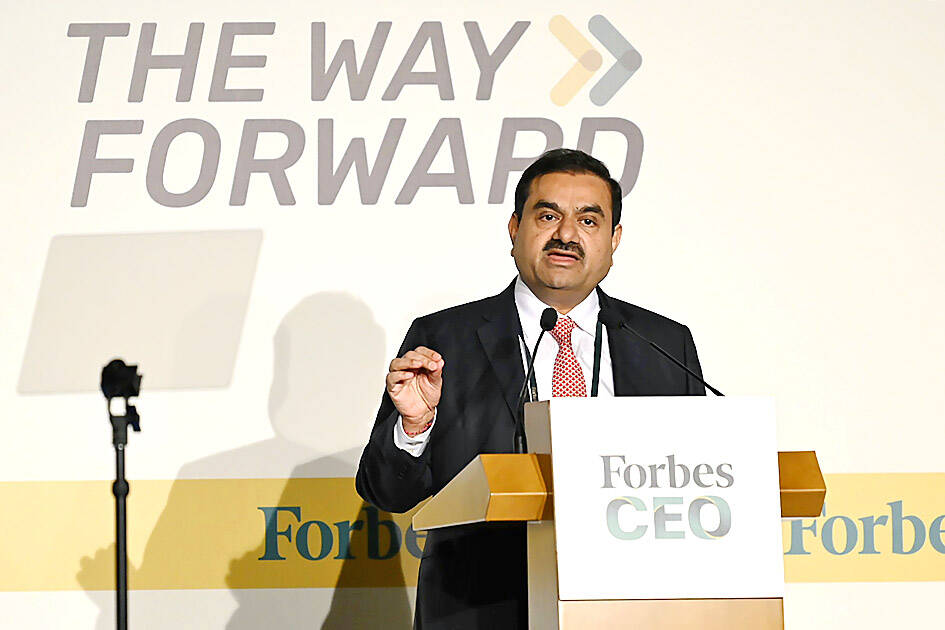India’s Adani Group is to invest more than US$100 billion over the next decade, most of it in the energy transition business, chairman Gautam Adani said yesterday, as the ports-to-energy conglomerate accelerates an already aggressive expansion plan.
After founding the group in 1988 as a commodities trading business, the 60-year-old has ventured into multiple sectors, mainly in the infrastructure space and in line with the priorities of the government of Indian Prime Minister Narendra Modi.
“As a group, we will invest over US$100 billion of capital in the next decade,” Adani, the world’s second-richest person, told the Forbes Global CEO Conference in Singapore.

Photo: Bloomberg
“We have earmarked 70 percent of this investment for the energy transition space. We are already the world’s largest solar player, and we intend to do far more,” he said.
He did not say how the investments would be financed. Debt research firm CreditSights said earlier this month it was concerned about the group’s leverage, though the group said its ratios were healthy and in line with industry benchmarks.
Adani has a personal fortune of US$143 billion, according to Forbes, behind only Tesla Inc chief executive officer Elon Musk. The combined market capitalization of the group’s listed companies is US$260 billion, growing exponentially in recent years.
The Adani Group has announced deals worth billions of dollars this year alone, the biggest one being its US$10.5 billion acquisition of Holcim AG’s cement businesses in India — Ambuja Cements Ltd and ACC Ltd.
Gautam Adani said the group wanted to be an inexpensive producer of green hydrogen — which is extracted from water using electrolysis in a process powered by renewable energy.
He said the group was in the process of building a 10 gigawatt (GW) silicon-based photovoltaic chain, a 10GW wind-turbine manufacturing facility and a 5GW hydrogen electrolyzer factory.
“It is an absolute game changer for India and opens up the unprecedented possibility that India could one day become a net energy exporter,” he said.
India is the world’s third-largest crude importer and consumer.
Adani said his group was India’s largest airport operator, with 25 percent of passenger traffic and 40 percent of air cargo. It is also the largest ports and logistics company in India with a 30 percent market share.
Adani also said China would feel increasingly isolated, as rising nationalism, shifts in supply chains and technology curbs threaten the world’s second-biggest economy.
China’s Belt and Road Initiative has run into resistance in many countries, challenging Beijing’s global ambitions, he said.
The property meltdown there has drawn comparisons with what happened to Japan during the “lost decade” of the 1990s, he added.
“While I expect all these economies will readjust over time — and bounce back — the friction to the bounce-back looks far harder this time,” Adani said.
Additional reporting by Bloomberg

Taiwan’s technology protection rules prohibits Taiwan Semiconductor Manufacturing Co (TSMC, 台積電) from producing 2-nanometer chips abroad, so the company must keep its most cutting-edge technology at home, Minister of Economic Affairs J.W. Kuo (郭智輝) said yesterday. Kuo made the remarks in response to concerns that TSMC might be forced to produce advanced 2-nanometer chips at its fabs in Arizona ahead of schedule after former US president Donald Trump was re-elected as the next US president on Tuesday. “Since Taiwan has related regulations to protect its own technologies, TSMC cannot produce 2-nanometer chips overseas currently,” Kuo said at a meeting of the legislature’s

TECH WAR CONTINUES: The suspension of TSMC AI chips and GPUs would be a heavy blow to China’s chip designers and would affect its competitive edge Taiwan Semiconductor Manufacturing Co (TSMC, 台積電), the world’s biggest contract chipmaker, is reportedly to halt supply of artificial intelligence (AI) chips and graphics processing units (GPUs) made on 7-nanometer or more advanced process technologies from next week in order to comply with US Department of Commerce rules. TSMC has sent e-mails to its Chinese AI customers, informing them about the suspension starting on Monday, Chinese online news outlet Ijiwei.com (愛集微) reported yesterday. The US Department of Commerce has not formally unveiled further semiconductor measures against China yet. “TSMC does not comment on market rumors. TSMC is a law-abiding company and we are

FLEXIBLE: Taiwan can develop its own ground station equipment, and has highly competitive manufacturers and suppliers with diversified production, the MOEA said The Ministry of Economic Affairs (MOEA) yesterday disputed reports that suppliers to US-based Space Exploration Technologies Corp (SpaceX) had been asked to move production out of Taiwan. Reuters had reported on Tuesday last week that Elon Musk-owned SpaceX had asked their manufacturers to produce outside of Taiwan given geopolitical risks and that at least one Taiwanese supplier had been pushed to relocate production to Vietnam. SpaceX’s requests place a renewed focus on the contentious relationship Musk has had with Taiwan, especially after he said last year that Taiwan is an “integral part” of China, sparking sharp criticism from Taiwanese authorities. The ministry said

US President Joe Biden’s administration is racing to complete CHIPS and Science Act agreements with companies such as Intel Corp and Samsung Electronics Co, aiming to shore up one of its signature initiatives before US president-elect Donald Trump enters the White House. The US Department of Commerce has allocated more than 90 percent of the US$39 billion in grants under the act, a landmark law enacted in 2022 designed to rebuild the domestic chip industry. However, the agency has only announced one binding agreement so far. The next two months would prove critical for more than 20 companies still in the process